Abstract
An experiment conducted at the corporate offices of a manufacturing firm investigated the effects of daily relaxation breaks on five self-reported measures of health, performance, and well-being. For 12 weeks, 126 volunteers filled out daily records and reported bi-weekly for additional measurements. After four weeks of baseline monitoring, they were divided randomly into three groups: Group A was taught a technique for producing the relaxation response; Group B was instructed to sit quiety; Group C received no instructions. Groups A and B were asked to take two 15-minute relaxation breaks daily. After an eight-week experimental period, the greatest mean improvements on every index occurred in Group A; the least improvements occurred in Group C; Group B was intermediate. Differences between the mean changes in Groups A vs C reached statistical significance (p < 0.05) on four of the five indices: Symptoms, Illness Days, Performance, and Sociability-Satisfaction. Improvements on the Happiness-Unhappiness Index were not significantly different among the three groups. The relationship between amount of change and rate of practicing the relaxation response was different for the different indices. While less than three practice periods per week produced little change on any index, two daily sessions appeared to be more practice than was necessary for many individuals to achieve positive changes. Somatic symptoms and performance responded with less practice of the relaxation response than did behavioral symptoms and measures of well-being. (Am. J. Public Health 67:946-953,1977)
Full text
PDF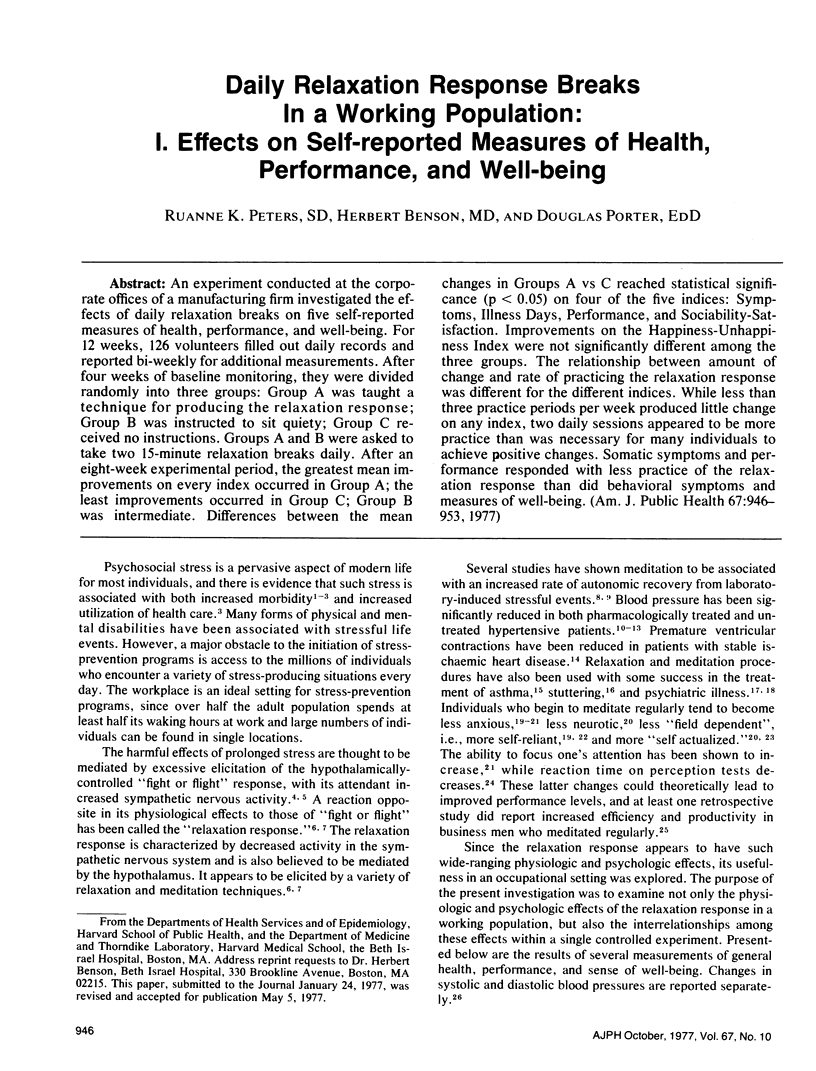
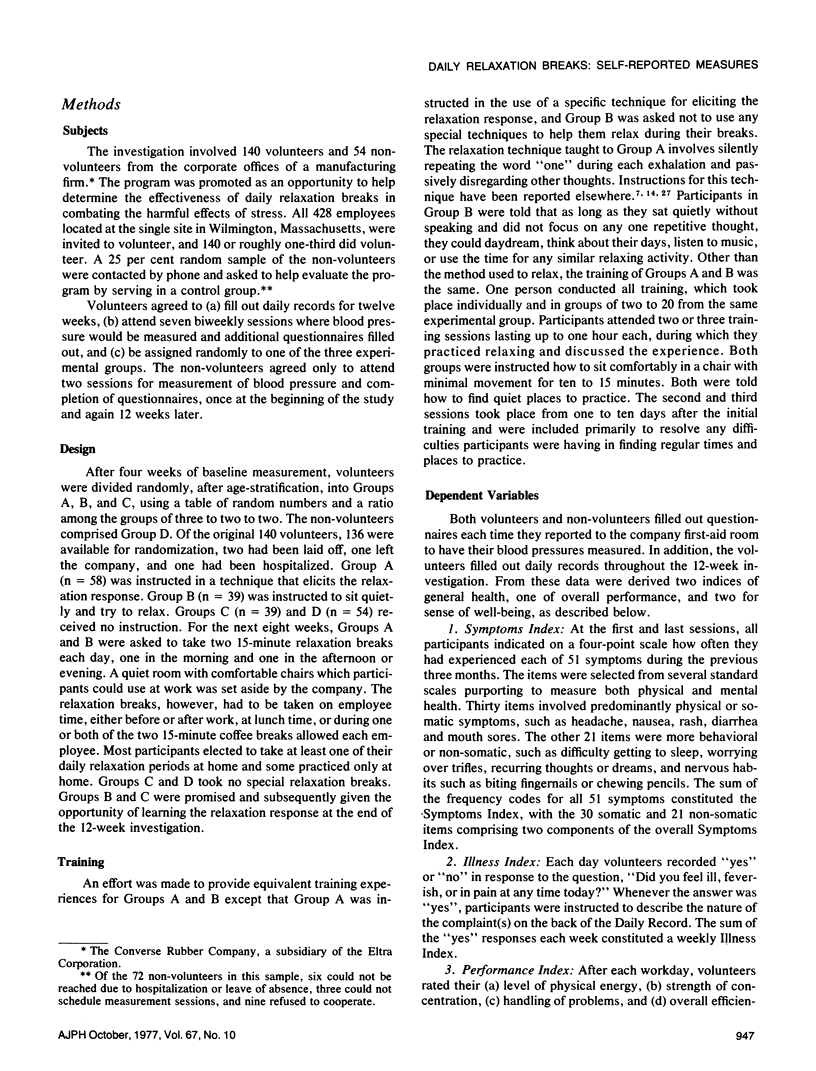
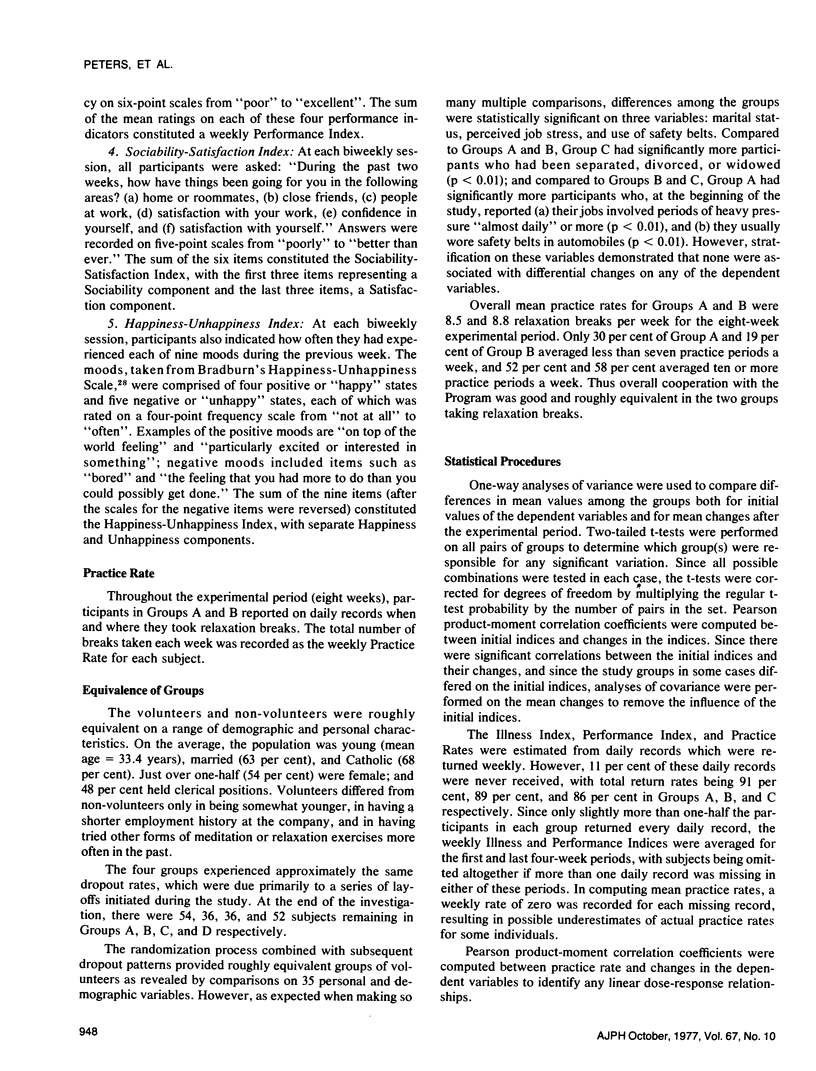
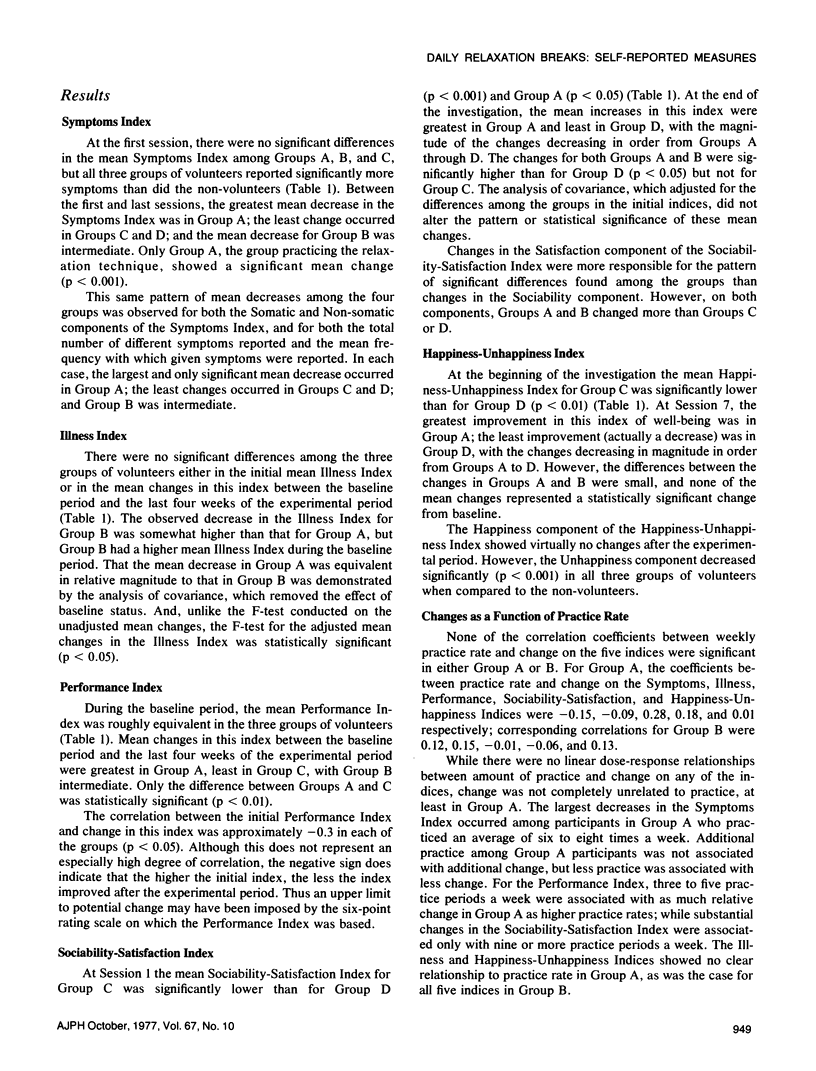
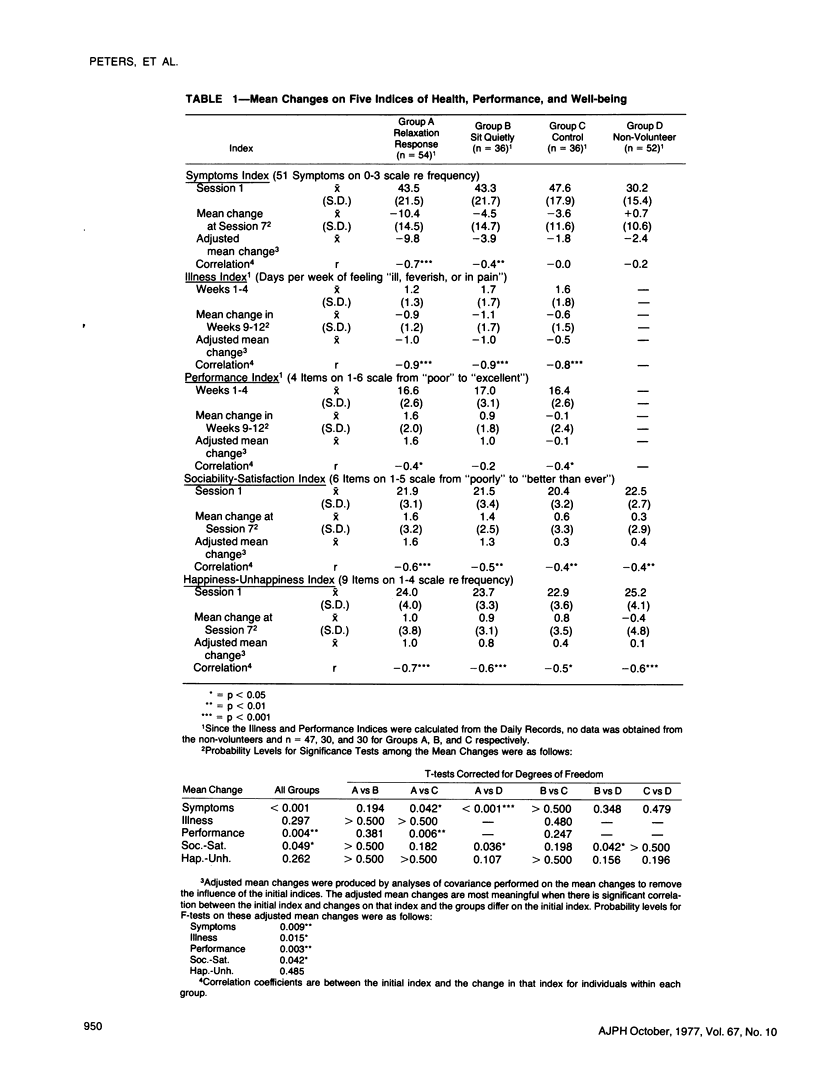
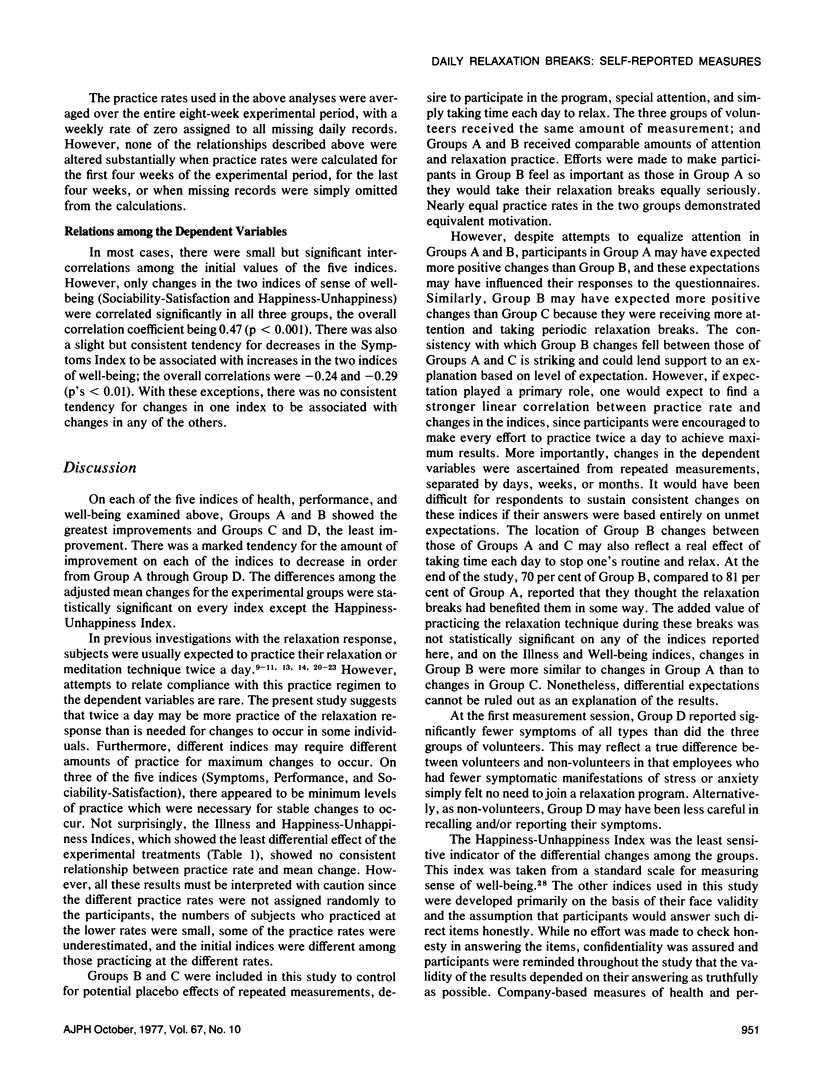
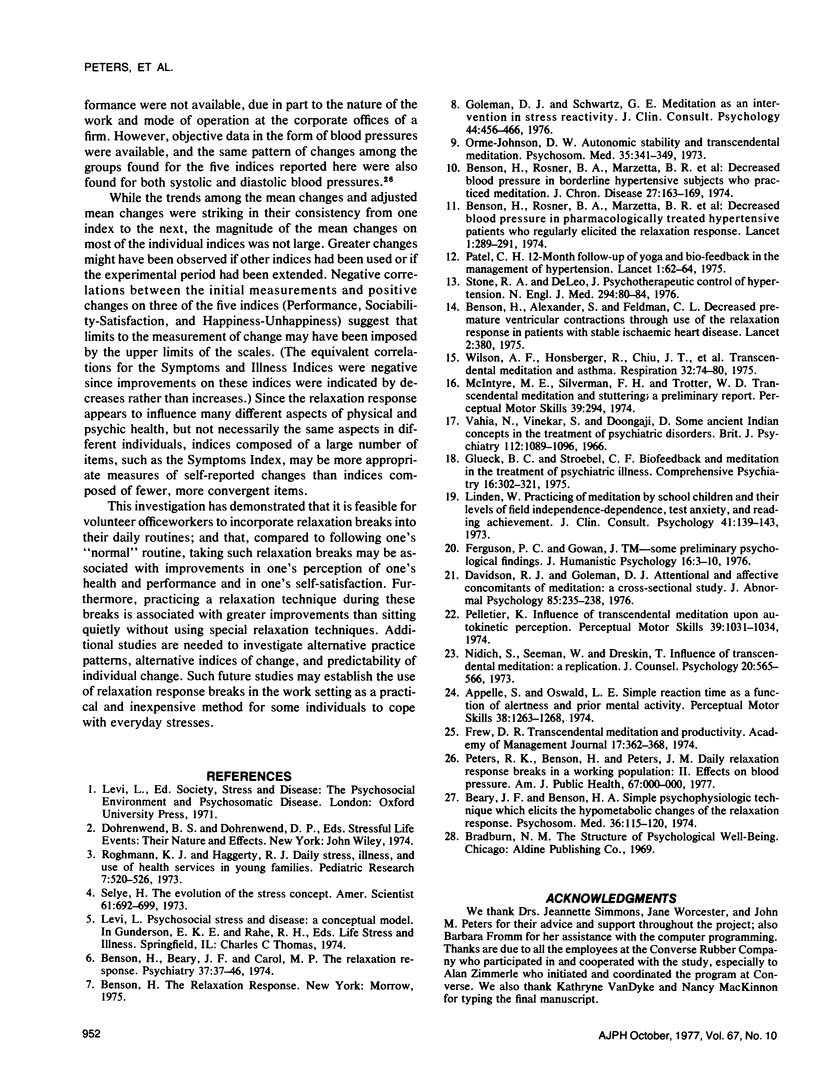
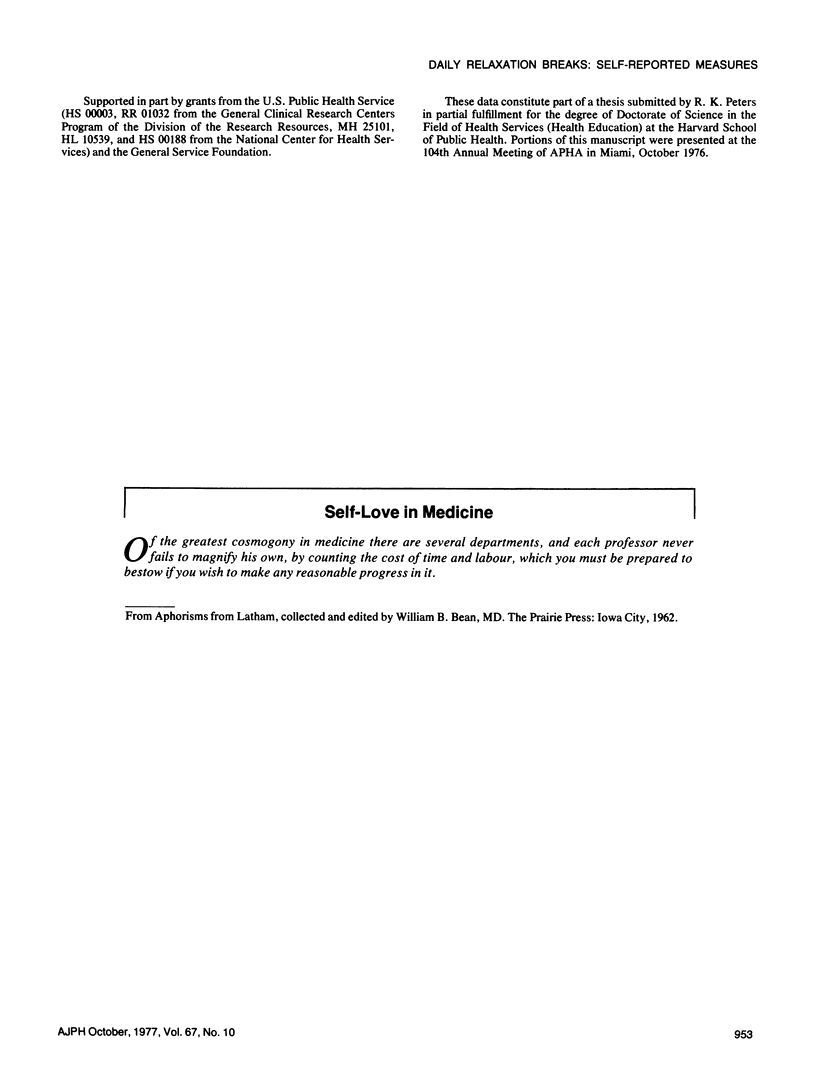
Selected References
These references are in PubMed. This may not be the complete list of references from this article.
- Appelle S., Oswald L. E. Simple reaction time as a function of alertness and prior mental activity. Percept Mot Skills. 1974 Jun;38(3):1263–1268. doi: 10.2466/pms.1974.38.3c.1263. [DOI] [PubMed] [Google Scholar]
- Beary J. F., Benson H. A simple psychophysiologic technique which elicits the hypometabolic changes of the relaxation response. Psychosom Med. 1974 Mar-Apr;36(2):115–120. doi: 10.1097/00006842-197403000-00003. [DOI] [PubMed] [Google Scholar]
- Benson H., Alexander S., Feldman C. L. Decreased premature ventricular contractions through use of the relaxation response in patients with stable ischaemic heart-disease. Lancet. 1975 Aug 30;2(7931):380–382. doi: 10.1016/s0140-6736(75)92895-0. [DOI] [PubMed] [Google Scholar]
- Benson H., Beary J. F., Carol M. P. The relaxation response. Psychiatry. 1974 Feb;37(1):37–46. doi: 10.1080/00332747.1974.11023785. [DOI] [PubMed] [Google Scholar]
- Benson H., Rosner B. A., Marzetta B. R., Klemchuk H. M. Decreased blood-pressure in pharmacologically treated hypertensive patients who regularly elicited the relaxation response. Lancet. 1974 Feb 23;1(7852):289–291. doi: 10.1016/s0140-6736(74)92596-3. [DOI] [PubMed] [Google Scholar]
- Benson H., Rosner B. A., Marzetta B. R., Klemchuk H. P. Decreased blood pressure in borderline hypertensive subjects who practiced meditation. J Chronic Dis. 1974 Mar;27(3):163–169. doi: 10.1016/0021-9681(74)90083-6. [DOI] [PubMed] [Google Scholar]
- Davidson R. J., Goleman D. J., Schwartz G. E. Attentional and affective concomitants of meditation: a cross-sectional study. J Abnorm Psychol. 1976 Apr;85(2):235–238. doi: 10.1037//0021-843x.85.2.235. [DOI] [PubMed] [Google Scholar]
- Glueck B. C., Stroebel C. F. Biofeedback and meditation in the treatment of psychiatric illnesses. Compr Psychiatry. 1975 Jul-Aug;16(4):303–321. doi: 10.1016/s0010-440x(75)80001-0. [DOI] [PubMed] [Google Scholar]
- Goleman D. J., Schwartz G. E. Meditation as an intervention in stress reactivity. J Consult Clin Psychol. 1976 Jun;44(3):456–466. doi: 10.1037//0022-006x.44.3.456. [DOI] [PubMed] [Google Scholar]
- Linden W. Practicing of meditation by school children and their levels of field dependence-independence, test anxiety, and reading achievement. J Consult Clin Psychol. 1973 Aug;41(1):139–143. doi: 10.1037/h0035638. [DOI] [PubMed] [Google Scholar]
- Mc Intyre M. E., Silverman F. H., Trotter W. D. Transcendental Meditation and stuttering: a preliminary report. Percept Mot Skills. 1974 Aug;39(1):294–294. doi: 10.2466/pms.1974.39.1.294. [DOI] [PubMed] [Google Scholar]
- Orme-Johnson D. W. Autonomic stability and Transcendental Meditation. Psychosom Med. 1973 Jul-Aug;35(4):341–349. doi: 10.1097/00006842-197307000-00008. [DOI] [PubMed] [Google Scholar]
- Patel C. 12-month follow-up of yoga and bio-feedback in the management of hypertension. Lancet. 1975 Jan 11;1(7898):62–64. doi: 10.1016/s0140-6736(75)91070-3. [DOI] [PubMed] [Google Scholar]
- Roghmann K. J., Haggerty R. J. Daily stress, illness, and use of health service in young families. Pediatr Res. 1973 May;7(5):520–526. doi: 10.1203/00006450-197305000-00005. [DOI] [PubMed] [Google Scholar]
- Selye H. The evolution of the stress concept. Am Sci. 1973 Nov-Dec;61(6):692–699. [PubMed] [Google Scholar]
- Stone R. A., DeLeo J. Psychotherapeutic control of hypertension. N Engl J Med. 1976 Jan 8;294(2):80–84. doi: 10.1056/NEJM197601082940204. [DOI] [PubMed] [Google Scholar]
- Vahia N. S., Vinekar S. L., Doongaji D. R. Some ancient Indian concepts in the treatment of psychiatric disorders. Br J Psychiatry. 1966 Nov;112(492):1089–1096. doi: 10.1192/bjp.112.492.1089. [DOI] [PubMed] [Google Scholar]
- Wilson A. F., Honsberger R., Chiu J. T., Novey H. S. Transcendental meditation and asthma. Respiration. 1975;32(1):74–80. doi: 10.1159/000193637. [DOI] [PubMed] [Google Scholar]


